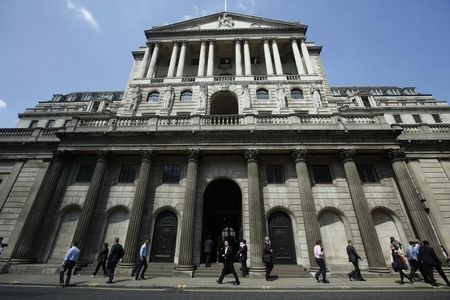By Ishaan Gera and Hari Kishan
BANGALORE (Reuters) - British interest rates will rise from record lows early next year as the UK economic recovery outpaces Europe's and inflation picks up, a Reuters poll of economists forecasts on Wednesday.
Although Bank of England Governor Mark Carney recently said a hike is getting nearer, only six of 60 economists polled this week expect it to happen this year, 48 forecast it in the first quarter of next year. Six see it coming later.
Recent strength in the British economy comes at the same time as a fall in inflation, which slowed to 1.5 percent in August -- stubbornly below the Bank's 2 percent target, but is expected to pick up in the coming months.
In the euro zone, Britain's biggest trading partner, inflation is at a five-year low of just 0.3 percent and the bloc's economy stagnated in the second quarter.
Dwindling demand from the euro zone has hurt British factories, with the latest data showing UK manufacturing grew at the slowest rate in 17 months in September.
"Once again we are likely to have policy stalemate. The economic recovery is becoming increasingly entrenched, but as yet there is not sufficient evidence to begin to normalise the stance of monetary policy," Investec chief economist, Philip Shaw, said.
Even after a "no" vote at the Scottish independence referendum last month, expectations on the timing of a rate hike were unchanged from previous polls.
Indeed, 14 of 25 economists who answered an extra question in the survey said that vote did not increase the probability of an earlier rate hike, while 11 said it did.
"We had assumed that Scotland would vote 'no', so conditional on that assumption the 'no' vote has no effect on our outlook for BoE policy," Wells Fargo global economist, Jay Bryson, said. "Had Scotland voted 'yes', then the probability of delay in hiking rates would have risen."
STERLING NOT SO STERLING
The Scottish referendum on independence and political fallout over a very close vote has hurt the pound, with the currency falling more than 5 percent against the dollar since July, wiping off gains made in the first half of the year.
This week's Conservative Party conference has so far served only to highlight political risks to sterling ahead of next May's parliamentary elections.
Sterling hit a two-week low against the dollar on Tuesday but firmed to a more than two-year high against the euro, the latest leg of a broad-based rally in the U.S. currency that dates back almost three months.
"While expectations regarding the direction of central bank policy have been instrumental to the dollar's broadbased recovery, the wider fundamental picture for the greenback has also improved," Rabobank senior foreign exchange strategist, Jane Foley, said.
A separate Reuters survey of nearly 60 strategists put sterling at $1.63 one month and three months ahead, at $1.62 in six months and $1.60 in a year, weaker than in a poll in September but not far from where it is trading.
Just as markets are focusing on when the BoE and the Federal Reserve will tighten policy, they also expect the European Central Bank to do more to stimulate the euro zone economy.
Such a move would weaken the euro, and cross rates calculated by Reuters suggest the common currency would be worth 77.6 pence in a month, 76.8p in six months and just 76.0p in a year. [EUR/POLL]

In September's poll the euro was pegged at 78.9p in a month, 77.4p in six months and 76.1p in 12 months.
(Polling and analysis by Diptarka Roy; Editing by Louise Ireland)
